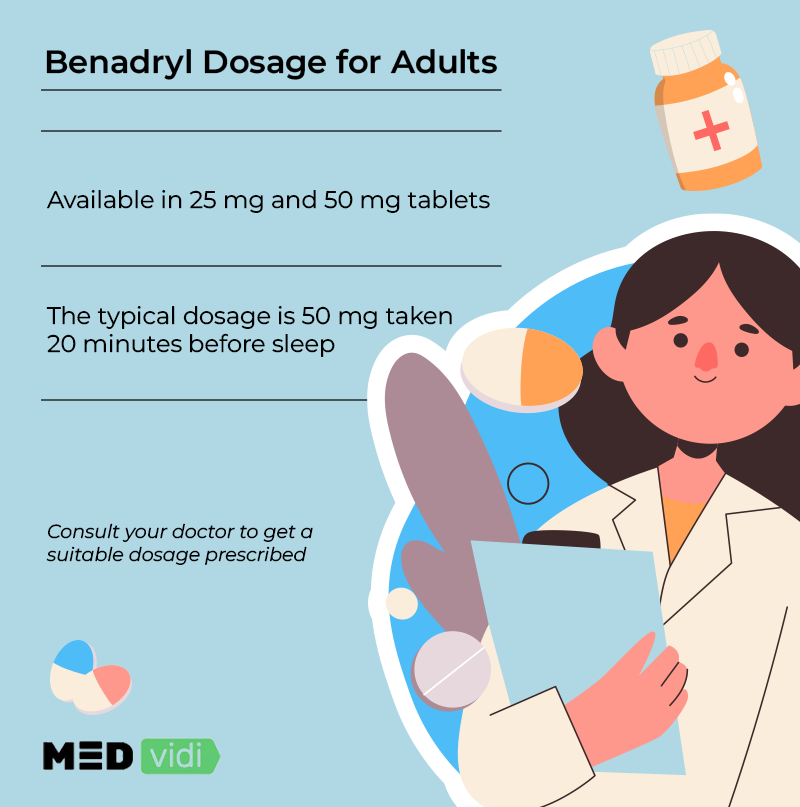Insomnia is quite a common disorder. The prevalence rate of chronic insomnia among adults is
Consult MEDvidi doctors to get the most suitable medications for insomnia prescribed online.
What is Benadryl
Benadryl’s active ingredient is diphenhydramine, which is used in antihistamine drugs. Antihistamine is a drug that inhibits the production of
Considering the above, does Benadryl make you sleepy? Yes, since the work of an antihistamine is to block the activity of histamine. And without histamine, the brain becomes drowsy.
Benadryl Dosage for Adults
Benadryl for sleep brand name has been discontinued, but it is still available in generic and other brand forms (capsules, tablets, and liquid) that can be taken with or without food. If you take it at night to help you sleep, the normal dosage is 25 to 50 mg. But the dosage can vary depending on the person. For instance, older people may take a lower dosage to minimize side effects.
Note: Stick to the prescription given by your doctor or pharmacist. If you’re taking the liquid form, use the measuring syringe or the dosage spoon to avoid overdose.
MEDvidi doctors will determine a personalized approach for you, including the choice of suitable medication, its dosage, and treatment duration.
How Long Does It Take for Benadryl to Work?
It usually takes 30 minutes for Benadryl to start working, but it reaches peak levels between 1 to 4 hours. The effects last for 4 to 6 hours. For these reasons, you should take the medication 30 minutes before bedtime. Notably, there’s no need to take it during the day if your primary purpose is to induce sleep.
The Duration of Treatment
Since Benadryl is an over-the-counter drug, it doesn’t have a strict dosage schedule. That said, most doctors don’t recommend taking it every night. One reason is that you can become dependent on the drug. When this happens, you won’t be able to sleep without it. Another reason is that you can develop tolerance. Once you become tolerant, you won’t get desired results after taking the drug.
One

Side Effects of Benadryl
Benadryl is safe when you follow the instructions. But depending on the dosage and the individual, it can cause side effects. One of the main Benadryl side effects is dryness concerns in the body. That’s because it blocks a natural substance in the body called acetylcholine.
Acetylcholine is a neurotransmitter that increases body secretion. Once blocked, the body reduces glandular secretion. As a result, you may experience dryness in the eyes, mouth, nose, and throat.
Additionally, you may experience dizziness or drowsiness the next day after taking Benadryl. Sometimes you can get blurred vision, feel confused, or feel as if you are going to pass out.
Other side effects of Benadryl include:
- Difficulty passing urine
- Pounding heartbeats
- Stomach upset and constipation
- Agitation
An overdose of diphenhydramine can cause convulsions, hallucinations, and even death.
Contact insomnia doctors if you experience any side effects to get your treatment adjusted.
Precautions Before Taking Benadryl
Benadryl can help induce sleep in adults struggling with insomnia but is not used for children. After taking this medicine, you might feel dizzy the next day. If this happens, take caution when driving or operating machinery. You should also avoid alcohol as it can make drowsiness worse. In addition, Benadryl can react with drugs like benzodiazepines, antipsychotics, and antidepressants, so inform your doctor or pharmacist about other medications you might be taking.
If you have a medical condition, consult your doctor or pharmacist before taking this sleep aid pill. Some health problems that raise concerns include:
- Kidney or liver diseases
- Problems with the digestive and cardiovascular system
- Breathing disorders like asthma
- Thyroid problems
- Glaucoma
It’s not clear how Benadryl affects an unborn child. But the drug can slow milk production for nursing mothers. It can also get into breast milk and affect the child. As such, consult with your doctor if you’re pregnant or breastfeeding.
The Bottom Line
Benadryl is the brand name of the antihistamine diphenhydramine. It’s an over-the-counter drug for dealing with short-term insomnia. If you have chronic insomnia, it might not be the best solution because it can cause dependence and tolerance. But you can still take it occasionally without making it a habit.
Avoid giving this drug to children to help them sleep. If you’re pregnant, breastfeeding, or have an underlying medical condition, consult your doctor before taking Benadryl. To know if this drug will help you manage insomnia or if you need another option, book an appointment with MEDvidi doctors today.













